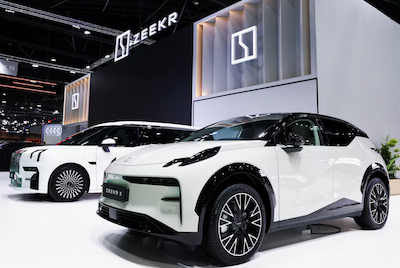Chinese carmakers have gained a strong foothold in Southeast Asia’s booming electric vehicle market, eating into the share of Japanese and Korean automakers that once dominated the region, new research has shown.
Chinese brands accounted for 70% of all EV sales in Southeast Asia last year, with carmaker BYD firmly in the lead, Hong Kong-based Counterpoint Research said on Friday.
The key to Chinese carmakers’ success has been a massive EV boom in a region being seen as the “world’s hottest market” for battery-powered vehicles.
Also on AF: China EV Firms Scaling Back European Plans Over Subsidy Probe
“As Japanese and Korean automakers, who dominate conventional vehicle sales, lag in EV adoption, Chinese OEMs (original equipment manufacturers) are stepping in to fill the gap,” Counterpoint analyst Abhik Mukherjee said.
Sales of electric vehicles in Southeast Asia more than doubled in the January to March quarter from a year before, the research firm said.
Sales of gas-powered ICE – internal combustion engine – cars, meanwhile, slid by 7%.
“Over 70% of EV sales in the region are from Chinese brands, led by BYD,” Counterpoint’s Mukherjee said. In the first quarter of last year, 75% of all EVs sold in Southeast Asia were made by Chinese carmakers.
Thailand, Vietnam take lead
Leading the charge of EV-adoption in Southeast Asia was Thailand, where Chinese car makers have committed more than $1.44 billion to set up new EV production facilities.
Thailand is the region’s second-largest economy, and a growing climate-consciousness among the country’s car buyers has given momentum to the EV transition.
The country — a regional auto manufacturing hub with long and major presence by Japan’s Toyota and Honda Motor companies — accounted for 55% of all Southeast Asia’s EV sales in the first quarter.
Thailand’s EV segment grew 44% compared to last year.
Meanwhile, Vietnam — another regional manufacturing hub — saw battery electric vehicle sales surge by more than 400%, Counterpoint said.
The country contributed to nearly 17% of regional sales, the research firm added.
Tesla market-share slips
Across the region, China’s top-selling EV maker BYD maintained pole position, cornering 47% of the regional market leader. Vietnam’s VinFast followed at the second spot.
BYD has had early success in Southeast Asia, which is still a small EV market compared to other regions, on the back of distribution partnerships with large local conglomerates.
US electric carmaker Tesla saw its market share in the region drop two percentage points to 4% in the first quarter, in spite of its sales growing 37% in the same period.
A number of Southeast Asian countries, including Thailand and Indonesia, have rolled out incentives to stimulate EV demand and attract new investments – a call answered by Chinese car makers locked in a bruising price competition at home.
“Southeast Asia is becoming a major expansion region for Chinese OEMs,” Counterpoint’s Mukherjee said.
View this post on Instagram
- Reuters, with additional editing by Vishakha Saxena
Also read:
BYD’s Thai Distributor to Triple EV Outlets as Sales Boom
Tesla Eyes Southeast Asia’s EV Boom But Faces China Challenge
Tesla in Thailand Electric Vehicle, Battery Factory Talks
China’s Hozon Taps Thailand to Make EVs For Southeast Asia
Foxconn EV Unit Keen to Make Small Cars in India, Thailand
China Firms Order Dozens of Ships For EV, Exports Surge
China Car Exports Hit Record High in April, as Local Sales Drop























